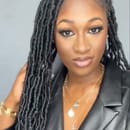In honor of Black History Month, I wanted to shed light on something that has been an immense turning point for many African-Americans working in the professional field. Hair professionalism. Our hair can be styled in a multitude of ways, whether in braids, locs, curls, twists, weaves, wigs, etc. Most of these styles are known as protective styles, which serve to promote growth and nourishment to our hair. For years, the way we wore our hair to work to meet professional standards has been mentally taxing. It affected our self-esteem, and has created a wedge between who we are and how we have to be when we are in these workspaces. For African-Amercans with naturally kinky and coily textured hair, some would have to go to the extent of altering their hair into a straighter texture to abide by professional standards. Others would sometimes have to cut off their locs, which take years to grow in length, into a clean cut in hopes of landing a job and/or looking “professional” enough for an interview. In Colin Kaepernick’s “Colin in Black and White”, a mini Netflix series, there was a scene that showcased an awkward interaction between a Black man and a hiring employer. The Black man dressed professionally in a suit and tie and had his dreadlocks styled in a ponytail. He answered the questions well, and has landed himself the job. During the interaction, the hiring employer, who was a White man, asked him questions about his hair and his body language showcased concerns. Looking confused, the Black man says to him and asks “Will this be an issue?”All of which are rooted in racism to appeal to White standards.
However, many states have decided to take a stand and implement laws that combat against hair discrimination known as the Crown Act. The Crown Act, an acronym for “Create a Respectful and Open World for Natural Hair”, is an act put in place to ensure equal educational and work opportunities to African-Americans who have and wear their hair in protective styles and natural textures. With this coalition, we are starting to see more African-Americans proudly embrace their hair and unapologetically be themselves. One of them being Eric Frans, Talent Acquisition Manager at PrimePay.
I was scrolling through my LinkedIn feed and I came across a post that Eric shared on the feed. The post reads:
“What does professional hair mean?💈
As a black man with semi-long hair, that’s not always easy to answer.
It can be different depending on where you are, who you’re with, and what you believe…those along with other factors can make it difficult to navigate at times in a professional environment.
But I’m SO thankful to be working at a company that encourages me to show up as my authentic self…with my fancy braid designs and all 😎😄
And that means A LOT to me.
So I’m sharing my holiday hair cause 1. My hairdresser really outdid herself 👏🏾💯 and 2. I believe it’s worth a conversation.
What does professional hair mean to you?”
I decided to reach out to Eric to learn more about any experiences he has had with hair professionalism. Here’s how it went:
Q: Describe your experiences with “hair professionalism”. How did it make you feel?
Eric: My experience with hair professionalism has been very positive! It’s at the point where I don’t really think about it anymore when it comes to my job. I used to wonder if it would be accepted in the places I worked and so far, it definitely has, which makes me feel great.
Q: Have you ever had to cut your hair, or style it a certain way to prepare for a job interview or important meeting? When did you realize this was an issue?
Eric: I’ve never had to cut my hair for a job or important meeting. I’ve made the decision to get it done in terms of getting a braid style I really liked so I felt confident going into whatever meeting. But I’ve never felt external pressure to do so.
Q: How has your company you work at now allowed you to embrace yourself and the way you choose to style your hair?
Eric: I always knew it was an issue. I know stories of former colleagues in other companies/organizations who have been pressured to style their hair a certain way, when their white counterparts are able to show up to work with their natural hair. That’s something that has been happening since I first got involved as an undergraduate student. The response to black hair in its natural state (especially for black women) has not been the same as it is for white hair.
Q: Any advice for young professionals making their way into the field and want to embrace their true selves and natural hair?
Eric: It’s important to do real research before joining a company or organization. What I mean by that is taking the time to reach out to the people of color who work or have worked at the organization to ask them the necessary questions about the culture. That’s where LinkedIn can be a valuable resource to help achieve that.
This year, I am happy to see an embracement of natural hair in professional workspaces. It’s rewarding to see individuals being transparent in their journey and having more open conversations about hair discrimination. There is still work to be done, but there has been an amplitude of African-Americans embracing their hair textures and feeling unapologetic while doing so. I am also proud to be someone who is actively contributing to this shift. So the next time you see Eric, a colleague or even myself in a protective style, or wearing our hair out in its natural state, just know that we are showing up as ourselves and will continue to #PassTheCrown.


